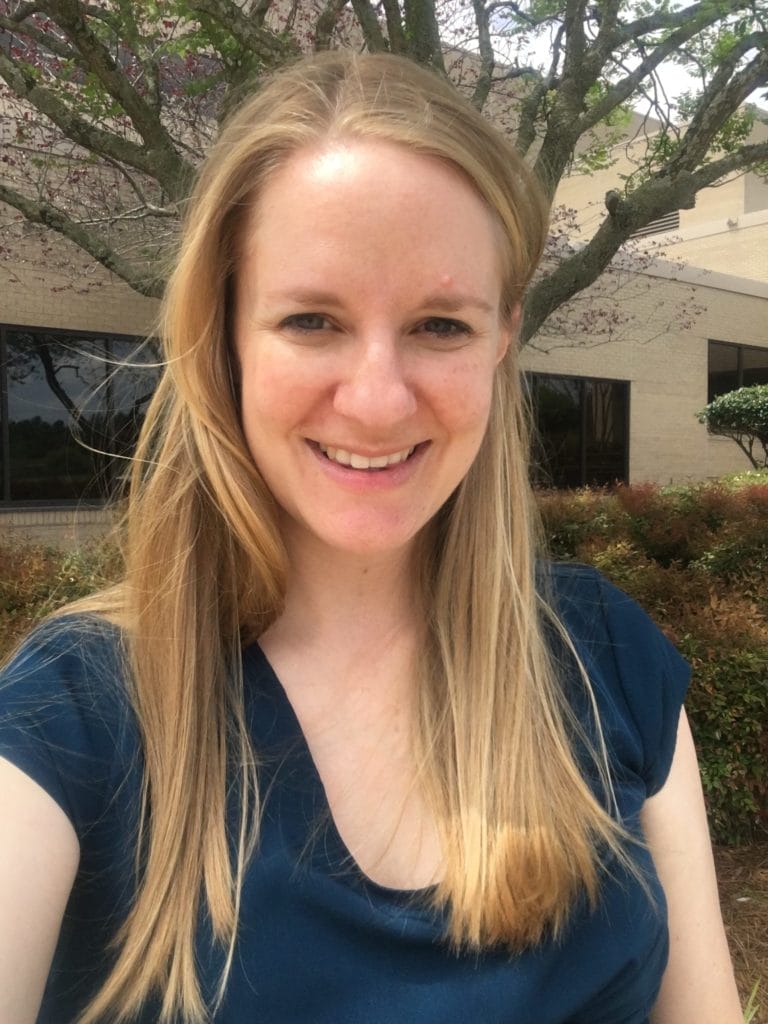
Nicole Magee, CCC-SLP, is from Bryant, Arkansas. She graduated from the University of Central Arkansas with her BA and MS degrees. She has been practicing as an SLP for 9 years.
What was your inspiration for becoming an SLP?
My inspiration for wanting to be an SLP started in High School when I worked at a daycare. I remember working with a child to help him say “cookie” instead of “tootie” and thinking of how rewarding that was, but at the time, I had never heard of speech-language pathologists. I knew in elementary school some kids left class to go to “speech” but I had no idea what that meant.
I originally went to Arkansas Tech University planning to major in communications and public relations. In my intro to communications course, my professor mentioned Speech Pathology as a career within the communications field. I remember that immediately struck me when I learned what they did. Speech pathology seemed like a career path where I could go to work, help others, and make a good living at the same time. I love working with people and knowing that my job is making a difference. Unfortunately, my current university didn’t offer speech pathology as a field so I had to throw away a full scholarship and go to a school where I had also previously turned down a full scholarship, but the student loans were worth it to become educated in a field that I love!
Could you walk us through your daily routine? A “day in the life of a PL therapist” if you will?
I work part-time so Tuesdays, Thursdays, and Fridays are the days I work the most. I don’t start working until 11:45am or sometimes 10am which gives me all morning with my son who is 2 and I also take care of my nephew who is also 2. We spend the morning time going to playdates or story time. I am currently pregnant so that allows me extra time in the morning to get myself together before I work because it’s been difficult. Mostly, it’s just time to spend with them. That’s what I wanted most from this job—a job where I could work and still spend time with my son and my nephew. We read lots of books or play outside or go for walks. I really treasure that time. I am typically a morning person so I have really appreciated having that time to spend with my son.
Then I have someone come stay at my house with my boys and I work from 11:45 until 4. After that it depends on if the days are short or long. If the days are long, I like to go straight outside because I’ve been in my office all day long, but if not, I’ll be inside and getting ready for supper and spending more time with my family. We also have a small church group we’re very involved with…my husband and I have been trying to build that up into a social community so we do that a lot in the evenings as well. That is a broad look at my days.␌
How old is your son?
My son is two. He’s turning three in April. I’m pregnant with our next child—we’re having a girl. We’re excited. My son seems pretty excited too. One thing that’s been awesome about spending time with my son—I get to spend so much time observing how his language is developing. Seeing a child with thriving language is pretty awesome as an SLP!
What were you doing prior to PL?
My husband was in the army prior to my joining PL so I shuffled around a bit. I worked in a school district right before PL, in a second and third grade school. Before that I worked in private pediatric practice which I loved. I just love working with kids and language. Prior to that I worked at a rural hospital with outpatient and nursing home, and inpatient as well. So I saw the full spectrum. My experiences taught me about what I wanted to do and what I didn’t want to do.
What made you want to be a teletherapist with PL?
When my husband got out of the army, we moved to rural Mississippi where we currently live. I decided I wanted a career where I could have flexibility and be home more. In this town there weren’t many SLP openings that would allow for that.
What’s your caseload like? What age group are you serving?
I serve Kindergarten through 7th grade. It’s quite a range. I appreciate the range because it gives me some variety and keeps me fresh with multiple goals, and cases, and children. I’m not working on the same thing all day so I appreciate that.
What do you enjoy about being a provider with PL?
PL has allowed me flexibility in my work schedule and has also given me an excellent network of support. If I don’t understand something, I feel like I can always find the answer with so many other SLPs working with me, through the Lounge, or through the library. My lead clinician has also been extremely helpful. I haven’t come across many questions that she doesn’t have the answer to!
Are there specific groups in the lounge that you go to for support or other resources you’d like to call out?
Groups that are specific to speech pathologists have been very helpful. So many places I worked I was the only SLP and so I didn’t have a community to run ideas by. Or if I had a situation I didn’t know how to handle, I didn’t have anyone there to talk to about it. So that has been extremely helpful to have someone to talk to, or just to get new therapy ideas—when you work with a kid for so long, you just need new ideas. The therapy ideas group has been great. I’ve taken a lot of ideas from that. So many people suggest resources that they’ve posted that are in the library so I go right then and find the resources.
The library has incredible resources. But I don’t always know what to search for. So that helps me know what to search for in the library.
My lead clinician is phenomenal. I feel like any question I could ask her, she would give me a good answer, whether it’s specific about a speech pathology question, or a school question, or scheduling question, she’s always on top of it, or if she isn’t, she gives me a resource to find the answer. That relationship has been invaluable. I don’t feel like I am by myself at the school. I feel very supported, as if I were at the school and had someone right there with me. That’s been very helpful.
What were you most surprised about when you made the transition to be a teletherapist?
I can be so far away from my kids but still feel connected!
Can you elaborate on how you stay connected and keep students engaged?
I communicate with them about what their interests are. A lot of times I can target their interests more specifically because there are so many resources in the library. Just like when I was at a school district physically, the kids love coming to see me just as they did when they were coming to my room. The kids still enjoy it and they still build a relationship with me and I with them. I can understand their strengths and weaknesses. I feel like the variety of resources that we have available to us allows us to build those relationships further, targeting specific interests, bringing out the kids’ strengths and excitement. If I was at a school, I’d be limited to the supplies I have in my room, or maybe in the school library. I feel like I am less limited.
What do you find most challenging about being a teletherapist?
Getting a thorough understanding from teachers about how my student is doing in the classroom has at times been challenging.
What’s one piece of advice you would offer a clinician who is considering taking a role as a teletherapist?
When I was considering teletherapy my hesitation was I thought I would miss face-to-face interactions. I thought I wouldn’t be able to develop close relationships with my students. I have found both of those not to be true. Now I feel like I still get to know my kids well. I’m able to develop those relationships and I’m able to see the gains that they make which is why I am in this career in the first place. It’s still just as rewarding. I thought one day I might go back to brick-and-mortar but once you start doing this and you’re able to revolve your career around your life instead of revolving your life around your career, it will make it hard to go back to a brick-and-mortar setting. With the four previous jobs, I had long commutes. That takes so much out of your day by the time you do the morning commute and afternoon commute. It takes an hour or more out of your day. That’s precious time.
Are you interested in joining the PL Care Network? Visit our Provider page to submit your application today!



